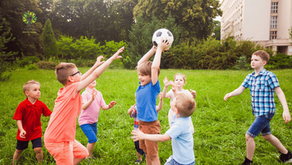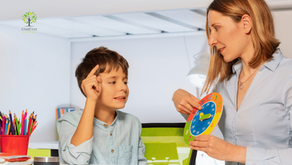10 Benefits of Outdoor Activities for Children with Autism
- ChildFirst Behavior Therapy
- May 21, 2024
- 6 min read
Outdoor activities offer a myriad of benefits for children, regardless of their neurodiversity. However, engaging in outdoor activities can be particularly advantageous for children with autism spectrum disorder (ASD). These activities provide an opportunity for exploration, social interaction, and physical exercise in a natural environment. In this article, we delve into the ten essential benefits of outdoor activities for children with autism. If you're looking for center-based ABA Therapy near me, incorporating outdoor activities into your child's routine can complement their therapy program and enhance their overall development.
ASD Stimulation:
ASD stimulation is crucial for children with autism, and outdoor environments offer a wealth of experiences that can significantly benefit them. Natural elements like sunlight, wind, water, and diverse textures provide rich input, aiding in autism integration and regulation. Exposure to these stimuli in a controlled outdoor setting helps children with autism develop coping strategies for the challenges they may face in daily life.
For instance, feeling the warmth of sunlight, hearing the rustling leaves in the wind, splashing in water, or exploring different textures like grass and rocks can all contribute to self-regulation. These experiences help children with autism become more aware of their preferences and care, ultimately enhancing their ability to navigate and engage with the world around them.
Reduced Stress and Anxiety:
The outdoor environment offers a calming and peaceful atmosphere that can help alleviate stress and anxiety in children with autism. Research has shown that spending time outdoors can lower cortisol levels, the hormone associated with stress, and promote relaxation. The open space, fresh air, and natural surroundings create a serene backdrop for children to unwind and regulate their emotions. In this calm outdoor setting, children with autism can find solace from the demands of everyday life and experience a sense of freedom. The opportunity to engage with nature allows them to immerse themselves in their experiences, promoting a sense of peace and tranquility. As they explore the natural world around them, they can discover new ways to cope with stress and anxiety, ultimately enhancing their overall well-being.
Enhanced Social Skills:
Outdoor activities present invaluable opportunities for children with autism to enhance their social skills in a more relaxed setting. Interacting with peers during outdoor play fosters vital communication, cooperation, and turn-taking abilities. Whether engaging in team sports or nature walks, group activities encourage collaboration and foster bonds among peers, promoting social inclusion and acceptance. Through these outdoor experiences, children with autism can develop essential social competencies that will benefit them in various social settings throughout their lives.
Improved Physical Health:
Regular engagement in outdoor activities significantly contributes to the physical health and well-being of children with autism. Participating in activities like running, jumping, climbing, and cycling facilitates the development of gross motor skills, strength, and coordination. Moreover, outdoor play encourages children to embrace active lifestyles, thereby reducing sedentary behavior and mitigating the risk of obesity-related health concerns. By fostering a habit of outdoor activity, children with autism can enjoy improved physical health and a better quality of life.
Emotional Regulation:

Outdoor activities provide children with autism valuable opportunities to regulate their emotions and behavior within a natural environment. The freedom to explore and play outdoors allows them to express themselves freely and release pent-up energy. Nature's calming effect and the absence of rigid structures enable children to self-regulate, manage stress, and cope with overload more effectively. In this serene outdoor setting, children can find solace and a sense of peace, aiding in emotional regulation and overall well-being.
Enhances Cognitive Development:
Exploring the outdoors catalyzes cognitive development in children with autism, igniting curiosity and fostering growth. Nature's bounty offers a vast learning landscape where children can observe, engage, and learn from their surroundings. Activities like nature scavenger hunts, gardening, and birdwatching not only spark curiosity but also hone problem-solving skills and ignite creativity. Through these outdoor experiences, children with autism enhance their cognitive abilities, developing a deeper understanding of the world around them while nurturing their intellectual growth.
Encourages Independence:
Outdoor activities provide children with autism the opportunity to cultivate independence and self-assurance. The unstructured nature of outdoor play encourages them to take the lead in exploration and decision-making. As they navigate through unfamiliar terrain, solve challenges, and embrace risks, children with autism develop resilience and bolster their self-esteem. Through these outdoor adventures, they not only gain confidence in their abilities but also learn valuable life skills that empower them to thrive independently.
Autism Integration:
Outdoor activities provide children with autism with a variety of experiences, aiding in autism integration. Exposure to natural stimuli like sunlight, wind, water, and different textures assists children in regulating their responses and building tolerance to input. Engaging in autism-rich outdoor play fosters the integration of information, enhancing attention, focus, and self-regulation skills. Through these experiences, children with autism develop essential processing abilities that support their overall functioning and well-being.
Nature Therapy:
Spending time in nature offers therapeutic advantages for children with autism, bolstering their mental health and overall well-being. Nature therapy, also referred to as ecotherapy or green therapy, leverages the healing potential of the natural environment to alleviate stress, anxiety, and depression. Engaging in outdoor pursuits like hiking, camping, and nature walks allows children to forge connections with nature, nurturing a sense of belonging and inner tranquility. By immersing themselves in the natural world, children with autism can experience profound emotional and psychological benefits, fostering a positive outlook and enhancing their quality of life.
Family Bonding:
Engaging in outdoor activities strengthens family bonds and creates lasting memories for children with autism and their families. Outdoor adventures offer opportunities for shared experiences, laughter, and bonding, strengthening familial relationships. Whether it's a weekend hike, a day at the beach, or a camping trip, outdoor activities provide valuable opportunities for families to connect, communicate, and enjoy each other's company.
Conclusion:
Outdoor activities offer a myriad of benefits for children with autism, encompassing physical, social, emotional, and cognitive domains. From autism stimulation to enhanced social skills and improved physical health, the outdoors provides a nurturing environment for children to thrive and grow. By embracing the therapeutic power of nature, we can create inclusive opportunities for children with autism to experience the joys of outdoor play and exploration.
Tap into your child's limitless potential with ChildFirst Behavior Therapy! Our compassionate team of professionals is dedicated to guiding your child's behavioral journey with expertise and care. Led by certified analysts and technicians, we provide tailored support to address your child's unique needs.
Empower your child for success by scheduling a consultation with us today. Let's embark on this journey together towards a brighter future! If you need the best ABA therapy service in Arlington Heights, book a consultation with us today at ChildFirst Behavior Therapy.
FAQs
What are outdoor activities for children with autism?
Outdoor activities for children with autism include any recreational or leisure activities that take place in natural environments, such as parks, forests, beaches, and playgrounds. These activities can range from nature walks and hiking to playing sports and gardening.
Why are outdoor activities beneficial for children with autism?
Outdoor activities offer a myriad of benefits for children with autism, including autism stimulation, reduced stress and anxiety, enhanced social skills, improved physical health, emotional regulation, cognitive development, independence, autism integration, nature therapy, and family bonding.
How do outdoor activities help with autism stimulation for children with autism?
Outdoor environments provide a wealth of experiences, including exposure to sunlight, wind, water, and diverse textures. These experiences aid in autism integration and regulation, helping children with autism develop coping strategies for challenges they may face in daily life.
How can outdoor activities reduce stress and anxiety in children with autism?
Spending time outdoors in a calming and peaceful environment can lower cortisol levels, the hormone associated with stress, and promote relaxation. The open space, fresh air, and natural surroundings create a serene backdrop for children to unwind and regulate their emotions.
What social skills can children with autism develop through outdoor activities?
Outdoor activities provide opportunities for children with autism to enhance vital social skills such as communication, cooperation, and turn-taking. Engaging in group activities fosters collaboration and bonds among peers, promoting social inclusion and acceptance.
In what ways do outdoor activities contribute to physical health for children with autism?
Regular engagement in outdoor activities promotes the development of gross motor skills, strength, and coordination. Additionally, outdoor play encourages active lifestyles, reducing sedentary behavior and mitigating the risk of obesity-related health concerns.
How do outdoor activities support emotional regulation in children with autism?
Outdoor activities allow children with autism to express themselves freely and release pent-up energy in a natural environment. The calming effect of nature and the absence of rigid structures enable children to self-regulate, manage stress, and cope with overload more effectively.
What is nature therapy, and how does it benefit children with autism?
Nature therapy leverages the healing potential of the natural environment to alleviate stress, anxiety, and depression. Engaging in outdoor pursuits like hiking, camping, and nature walks allows children to forge connections with nature, fostering inner tranquility and a positive outlook.
How can families benefit from engaging in outdoor activities with children with autism?
Engaging in outdoor activities strengthens family bonds and creates lasting memories. These shared experiences offer opportunities for communication, laughter, and bonding, enhancing familial relationships and promoting a sense of unity.
Are there specific outdoor activities recommended for children with autism?
While the choice of outdoor activities may vary depending on individual preferences and interests, some recommended activities include nature walks, gardening, sports, camping, hiking, birdwatching, and scavenger hunts. These activities provide opportunities for exploration, social interaction, and physical exercise in natural environments.



